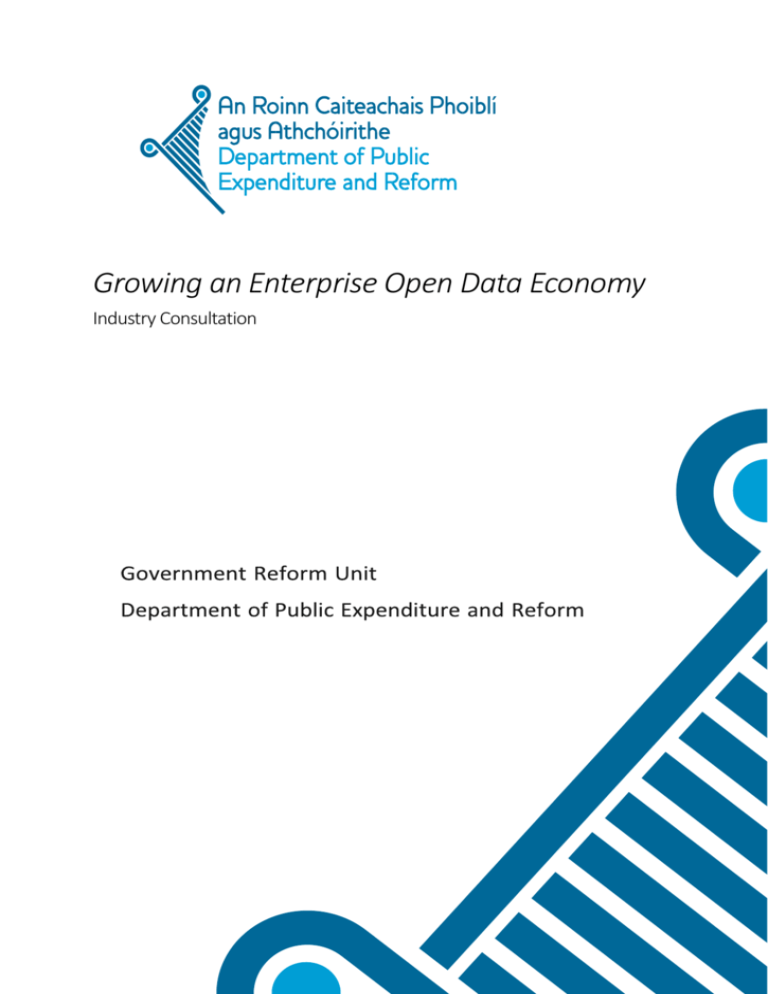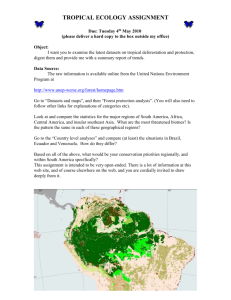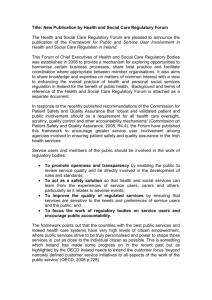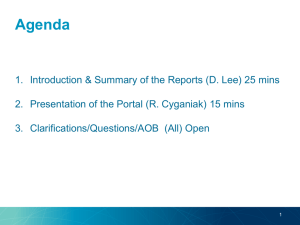Open Data Business Paper here - Department of Public Expenditure
advertisement

Growing an Enterprise Open Data Economy Industry Consultation Growing an Enterprise Open Data Economy Contents 1. Background on the Open Data Initiative.................................................................................... 3 2. Objectives of the Consultation................................................................................................... 3 3. Presentations ............................................................................................................................. 4 4. Roundtable on Realising the Economic Benefits of Open Data ................................................. 4 5. Addressing the Challenges ......................................................................................................... 5 5.1 Open Data Strategic Vision for Business .................................................................................... 5 5.2 Opportunities for Research ........................................................................................................ 6 5.3 Opportunities for Established Businesses .................................................................................. 7 5.4 Opportunities for Start-Ups ....................................................................................................... 7 6. Open Data Enterprise Forum ..................................................................................................... 8 7. Conclusion .................................................................................................................................. 8 The Minister for Public Expenditure and Reform, Mr. Brendan Howlin, T.D., launched his Open Data Initiative in July 2014. As part of the outreach and engagement activities around the Open Data Initiative, the Department of Public Expenditure and Reform, with support from Fujitsu Ireland, organised an industry roundtable to capture the views of the business community on the Open Data Initiative. 1. Background on the Open Data Initiative The concept of Open Data is about making data held by public bodies available and easily accessible online for reuse and redistribution. A common definition of Open Data is that a piece of data or content is open if anyone is free to use, reuse, and redistribute it — subject only, at most, to the requirement to attribute and/or share-alike1. The Civil Service Renewal Plan recognises data as a key corporate asset and the Public Service ICT Strategy identifies data as a critical enabler of Public Service Reform. The release of Open Data can allow this asset to deliver social, economic and democratic benefits across society. To ensure that the views of all stakeholders can be heard, the Department of Public Expenditure and Reform has organised and participated in a number of events to raise awareness and promote the Open Data Initiative; and to listen to the views of participants. Ireland’s Open Data Initiative intends to encourage public bodies to release data in open formats and to create an environment in which the use and re-use of open data to help realise social, democratic and economic benefits is encouraged and facilitated. While the Open Data Strategy objectives will be achieved over time, the target is that all appropriate datasets will be “Open by Default”. Open Data’s contribution to strengthening openness, transparency and accountability is a core element of Ireland’s Open Government Partnership National Action Plan. The success of this Strategy will depend on engagement and cooperation between all stakeholders. In his opening remarks, the Minister highlighted that the next phase of the Open Data Initiative will involve significant engagement with citizens, business, researchers, and public bodies and is a core element of Ireland’s approach to Open Data. 2. Objectives of the Consultation Events like the Industry Consultation will help to create an environment where the economic, social and democratic opportunities and benefits of Open Data are recognised and grasped. Regarding the potential economic impact of Ireland’s Open Data Initiative, Open Data can drive new innovation and provide opportunities – including commercial opportunities – for businesses, citizens and public servants to realise the true value of Open Data. In her address, Fujitsu Ireland’s CEO, Ms Regina Moran, spoke about the potential economic benefits associated with Open Data. The development of use cases demonstrating how these benefits are being realised will provide new momentum to the Open Data Initiative. 1 http://opendatahandbook.org/guide/en/what-is-open-data/ The Open Data Enterprise Event provided a forum for engagement between public bodies and business to help drive implementation of the Open Data Initiative and to identify opportunities to develop an Enterprise Open Data Economy in Ireland. The Industry consultation provided an opportunity to: Capture key recommendations from the audience and panellists which will inform future policy decisions and help to build a value driven economy around open data; Identify datasets that would lead to economic benefits; and Invite the Enterprise Sector to form an industry user group to lead engagement between business and the Department of Public Expenditure and Reform, and to help identify and measure realisation of the benefits of Open Data. 3. Presentations The Event commenced with a series of presentations by: Jason Roe (Predict Insights Ltd), who provided an overview of commercial opportunities presented by Open Data; examples of Open Data business models that work; outlined some examples of datasets that make the difference; and emphasised the importance of creating a vibrant developer community to leverage Open Data. Professor Stefan Decker (Insight at NUIG), who provided an overview of the Open Data landscape, including international initiatives to encourage Open Data growth; the type and variety of information that is “open”; standards and frameworks required to enable effective Open Data integration and analysis; and challenges regarding privacy and confidentiality. Cronan McNamara (Creme Global), who shared his experience of building an effective analytics engine; outlined the skills and knowledge needed to harness data and Open Data effectively; and his organisation’s experience of effectively combining open and proprietary data to realise commercial value. 4. Roundtable on Realising the Economic Benefits of Open Data Following the presentations, a round-table discussion considered the potential commercial opportunities of Open Data, in the context of the potential economic benefits of Open Data that have been widely reported. These benefits are expected to be generated in three main areas: Business innovation: Broader and more rapid access to data will make it easier for researchers and businesses to build on Government research. This may boost innovation capacity in fields like pharmaceutics and renewables. Business Creation: Opportunities for Open Data inspired products or services which add value to the data generated by public bodies. Business efficiency: Businesses and public bodies could benefit from Open Data by gaining more precise and complete insight into customer preferences and needs, thus becoming more efficient in tackling those needs and at the same time contributing to a smart growth. The Open Data Initiative aims to create an environment where stakeholders, including the Business community, engage with public bodies to demonstrate use cases and identify datasets with the potential to deliver benefits, including commercial benefits. This Industry Consultation is the first step in business and public bodies working together to address the five key challenges that will help achieve these benefits. Five Challenges 1. Identify areas where releasing datasets as Open Data, and encouraging entrepreneurs to develop Open Data enabled commercial opportunities, will deliver measurable economic benefits; 2. Use good quality Open Data for improved data-driven decision making and analysis, which allows for the development of new products and services; 3. Select an appropriate Open Data licence to ensure that data can be used, and that reflects the need to ensure that privacy and personal data and protected; 4. Encourage research into metrics helping to capture benefits and valueof Open Data; and 5. Establish an Open Data Enterprise Forum to support the Open Data Initiative and help Irish businesses understand, exploit and deliver the potential benefits of Open Data. 5. Addressing the Challenges 5.1 Open Data Strategic Vision for Business The discussions at the round-table were taken into consideration during the preparation of the “Foundation Document for the Development of the National Open Data Strategy2”, and informed the formulation of the high level strategic vision for Open Data. The Foundation Document envisages that Businesses will: 2 Support the Open Data Initiative by seeking out and using Open Government Data to develop and improve data services and products. Identify sectors where potential economic benefits can be achieved by wider availability of Open Data. Develop their own strategies to exploit the value of Open Data. Participate in measurement activities to capture benefits realisation of Open Data-enabled enterprise. Communicate Ireland’s success in Open Data internationally to foster further investment and innovation using Open Data http://www.per.gov.ie/minister-howlin-launches-next-steps-in-the-open-data-initiative/ Recommendations Business Enterprise Sector to identify any gaps in the Vision for Business for the Open Data Strategy. Develop organisation Open Data strategies to exploit the value of Open Data. Engage with public bodies in developing use cases and measuring the impact of Open Data in the Enterprise Sector Public Bodies Incorporate requests from the Enterprise Sector into Data Audits and Publication Planning processes. Include businesses in ongoing outreach and collaboration activities. Consider possible opportunities around Investment by Enterprise Agencies. 5.2 Opportunities for Research Research offers an opportunity to maximise the potential for Open Data and data analytics to improve public policy making, create opportunities for economic growth, and to ensure an evidence-based approach to combining datasets to improve outcomes for all. Progress in this regard must take full account of any privacy issues that may emerge from combining multiple datasets. The forum recognised the potential for Open Data to help identify new business opportunities, to help people, public bodies and businesses to make better decisions. Open Data also has the potential to improve the efficiency and effectiveness of Public Service delivery to enterprises. The Research Community, both within academic institutions and in businesses, has a key role to play in identifying the economic, social and democratic opportunities of Open Data. This has also been recognised in the “Foundation Document for the Development of National Open Data Strategy”. Researchers will: Identify emerging national and international trends for Open Data. Develop metrics that allow benefits capture: for example, what contribution does Open Data make to improving efficiency and effectiveness of Public Service delivery. Identify opportunities to improve accountability and transparency through Open Data. Consider the potential for increasing citizen engagement in Open Data activities. Through publication of Use Cases, help drive uptake of Open Data for Research and Development purposes. Use Open Data to further innovation through research and, where the research is publicfunded, make their research findings available in Open Data formats. Identify future skills needs to ensure students acquire the skills necessary to succeed in a datadriven economy. The discussion also covered the issue of data held by academic research facilities. Frequently, Institutions might release their findings without releasing the associated raw data for consumption by others. Enterprises suggested that access to scientific data will make it easier for researchers and businesses to build on the findings of government/public funded research. This, it was argued, would have a positive impact on their capacity for innovation in areas such as pharmaceuticals, renewables and a range of other areas. The discussion also identified the importance of progressing with irreversible anonymisation and/or aggregation of data to ensure that the potential benefits of using data (in delivering progress in the treatment of medical conditions) are achieved will taking account of all legal requirements for data protection and privacy. 5.3 Opportunities for Established Businesses It is important that established businesses see the opportunities and value associated with Open Data and are able to develop business cases to realise these benefits. The discussion considered the business possibilities of combining published and proprietary data with domain to help develop their predictive modelling capabilities. This will allow enterprises to develop metrics and to use Open Data to raise productivity. It was noted that Open Data “can propel innovation and help organizations replace traditional and intuitive decision-making approaches with data-driven ones. Open-data analytics can also help uncover consumer preferences, allowing companies to improve new products and to uncover anomalies and needless variations. That can lead to leaner, more reliable processes3”. By developing stories outlining the successes achieved by enterprises using Open Data, and by sharing these with the Public Service, a partnership approach will allow for the targeted release of appropriate high value, high demand datasets by public bodies. Big business has an important role to play in showing the value proposition and business cases that can make Open Data attractive to businesses, public bodies and all other stakeholder groups. 5.4 Opportunities for Start-Ups The round-table also recognised that significant start-up activity is happening in Ireland. The group noted the possibilities for Open Data to fuel further innovation, including in terms of new Apps that are based on Open Data. It was acknowledged that this will require effort and commitment for it to work. There needs to be a structured plan to engage, with short term and long term targets that need to be effectively communicated to group stakeholders. By engaging with these stakeholders, there is an opportunity to work with that community to drive Open Data. It was noted that Apps development can provide enormous benefit to citizens; and that it will be important to capture how Open data can fuel further developments in this area. There are a few examples of innovators identifying a gap in terms of important information, and build on a simple idea such as “where can I park”. By clearly defining a problem, new Start-Ups can thrive using Open Data. As with more established businesses, Start-Ups might find that a combination of Open and Closed Data will provide opportunities for initial consolidation and future growth. 3 “Open data: Unlocking innovation and performance with liquid information” 6. Open Data Enterprise Forum Through the establishment of an Enterprise Forum, business will be able to develop a coordinated approach to Open Data engagement with the Public Service; and help to focus efforts to identify and deliver short, medium and long term benefits. Recommendations Business Industry to establish an Open Data Enterprise Forum Identify potential datasets that will help to deliver economic benefits Capture Open Data benefits realisation and feedback to Public Service Public Bodies Work with Industry to prioritise the release of datasets that have potential to deliver economic benefits Identify and adopt the appropriate Open Data licence Engage with the Open data Enterprise Forum, when established 7. Conclusion Studies have indicated that there is huge economic potential for Open Datai. The round-table meeting recognised that this potential can be delivered through a collaborative effort between public bodies and business. The issues outlined in this paper will be further analysed as part of ongoing collaboration and engagement with the business community, to ensure that D/PER, public bodies and the business community will consider activities to develop use cases for Open Data, drive further publication of high-value datasets by public bodies that meet real needs, and set out a roadmap for further engagement over the duration of the Open Data Initiative. i e.g., http://www.mckinsey.com/insights/business_technology/open_data_unlocking_innovation_and_performanc e_with_liquid_information




